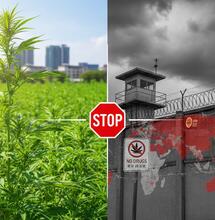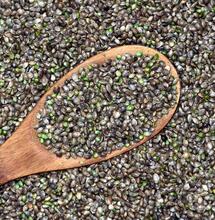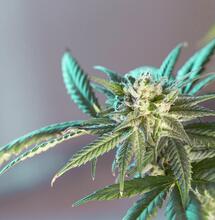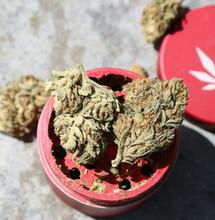Gun Battles and the Revolution
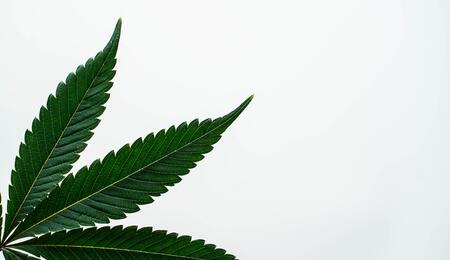
If you don't already know, the people of the Rif Mountains in Morocco produce more than sixty percent of the world's hash, but like a few other economies of the day, the ganja economy of the Rif has taken a bit of a battering over the last couple of years. Stories have been circulating of army-orchestrated crop slashing, crop confiscations, and running gun battles between Riffians and the Moroccan state authorities, so we put on our hiking boots and wandered up into them there hills to see if we could find out what the Ketama had been going on...
Let's talk about politics and economics: Riffian ganja politics and economics, to be precise.
Rewind to the end of 2008: with Morocco keen to join Mediterranean free trade agreements (and potentially Euroland) they have to be seen to be responding to pressure that the EU and US apply with respect to clamping down on the pot trade. The trouble with this is that the laws that give the Ketamese people the right to grow Cannabis are royal laws (circa 1950s) as opposed to governmental laws. This means the government can't throw its weight behind any clampdown without the say-so and support of the current king, Mohammed VI, and he'll be responsible for starting a separatist war in the Rif if he dishonors his predecessor’s word and outlaws Cannabis farming. So, legally and politically, it's a bit of a sticky situation.
In order to deal with the issue transparently and to let the Moroccan nation know what was going to happen, the issue was debated live on TV in a series of debates chaired by Mohammed VI himself. At the end of the debate it was decided that the laws of Ketama would be honored, but the elements of the trade that were spilling over the Ketamese borders would be policed with zero tolerance.
Mustafa was a small-time farmer who lived just outside the province of Ketama in a small agricultural village. The first time we met he was well-dressed, fit, healthy, relaxed and proudly selling some of the finest hash on the planet, his own Paki/Afghan combination. His four kids were in school, the kitchen cupboards were stocked, and the family was being looked after. Then came the first wave of the great repression, harvest time 2009.
“The King, the army and the police, they come into the mountains and confiscate all our hash crop, everything, they pay us compensation and burn all the plants – people go crazy. I cannot work on the farm anymore; if they come again then I go to jail, my village still runs the farm but this year we have no more quality like last time, I can still get you Mustafa quality but not for same price.”
Mustafa's clothes were looking old. He hadn't shaved for a week or so and the stress of hustling was written all over his face. “Money is difficult now, I take my daughter out of school. If you want good quality I can get it for you, how much you want? Twenty dirham a gram.”
The 2009 harvest seizures could not have come at a worse time for another farming family on the edge of the Rif. In the summer of 2008 Abdul, the old man of the family, had broken his leg in a fall on the mountain; he had needed an expensive operation that the family had actually been able to pay for, courtesy of the previous year's pot profits. After his operation the doctors put him on strong painkillers – these came with side-effects though, so the doctors prescribed him more expensive chemical medication to combat his nausea. His son detailed their struggles:
“They take all our crops, todo. Compensation small – we need money for [my father's] medication. Doctors no good, they make sickness and now we pay mucho dinero to make doctor's sickness good. If we grow food is not much for money, now no hashish? Is crazy my friend, crazy – this is the Rif mountains, this is Ketama. Why they say we no Ketama? Government line on map is stupid, is wrong. Next year I grow hash anyway, 600 plants for this field,]; I must, to look after my father and my family, but if police come... Insha'Allah.”
These actions of the state had been expected, though, and as drug purges go this one had been relatively civilized. So, despite all their bluster and troubles, the families weren't too fazed by all the drama; they'd survive, it wasn't the first time something like this had happened to them.
Then, something totally unexpected occurred the following spring, planting season 2010. Totally unannounced, the cops and the army went up into the mountains of Ketama and started arresting farmers who were planting new crops. They slashed and burned any plants that were already growing, and raided hash stashes. The situation exploded. The Riffians took up their guns, swords and daggers and fought to keep the cops and the army off their land for, sometimes, days and nights at a time. Mustafa gave us a glimpse of what was going on with this dynamic situation.
“One of my good customers, he want some hashish, good Mustafa quality, so I have to go other village. In the daytime is dangerous with the police on the roads so I go by taxi en la noche. The taxi he take me near to the village, then I have to follow goat tracks. I hear guns: pow, pow, bang, bang! I go to my brother's house, but my brother fight with police for three days and three nights. The police want to stop the hashish but this is no good, is against the King's law, but he stay quiet – where is the King? We want to speak with the King again, tell him to come to the mountains and speak with us if he wants peace. Yesterday I no sleep, but today I have good quality, you want the Mustafa quality? We still have the good quality in the mountain – twenty dirham a gram.”
Other people were starting to get a bit panicky now as a result of the springtime raids. “Prices go up next year, maybe this is the end of hashish – if is the end of hashish then is the end of tourism; maybe this is the end of our lives,” is how one distressed soul put it to us.
But what was really going on? Most people first thought that the repression was to pacify the Western politicians and to grab a few headlines. This happens every five or six years to some extent, but this time the government was pushing a lot harder – why were the royal laws being violated? Why were the Ketamese being punished for European tastes and demands? Were the authorities trying to gauge how far the locals could be pushed before they fought back? If they were, then they got their answer very quickly.
Regardless of the motivations and methods of the clampdown, the spring 2010 purge had two major effects: a lot of the planting was delayed until the last possible moment, so the crop was late; plus the 2010 crop was also a small one – despite being a great year for growing, in climatic terms. All this had other effects throughout Morocco and Europe as well, a list that includes the familiar dent in supply and availability, a rise in the cost and, worst of all, a sharp rise in the quantity of adulterated product on the market.
Morad, from Casablanca, told us about the lengths he and his friends had to go to sort themselves out with a bit of decent smoke:
“The hash in Casa was terrible last year, so bad, so much henna; it was so bad, me and five of my friends drove to Ketama to get some good stuff, but no one trusted us! They’re so paranoid! I swear, sometimes it's easier for foreigners to buy hash in Ketama than it is for Moroccans. We had such a difficult time, after ten days we had maybe twenty grams of good quality hashish but we had to go home again. When we were driving home we got stopped by the police; he asked us where we were from and where we were coming from and then he told us to hand it over – he knew we had some. We gave him our ball and he laughed. 'Is that it?' he say to us, then he say he have to confiscate it. We were so upset but we made a joke with him, and in the end he let us pay him twenty euros and twenty percent of our hash – Moroccan police are not so bad if you know how to deal with them.”
Harvest time 2010 was pretty much a repeat of the previous year, inasmuch that farms on the outer fringes of Ketama were getting turned over again. Crop slashings and confiscations were par for the course, but it has to be said that we did not hear of any farms being targeted, two years running. It also seems that the 2010 harvest clampdown was less intense than the previous years – word is that the infrared satellite imaging of the Rif shows exactly how much weed is being grown in the mountains, so the authorities would have been well aware that their springtime raids had had their desired effect for the year.
Then the Arab world erupted, and the revolutionary fervor swept all the way across North Africa to the Maghreb. Keeping control of the cities and policing the demonstrations and protests in Morocco had proven to be a full time job for the authorities in 2011. The Riffian farmers were quick to realize what this meant: less cops and resources on their mountainous turf. Having already been revolutionized by the previous couple of years, the farmers took to the streets as well.
Weekly protests are still taking place across Morocco, and they are dominating the time and resources of the state authorities. In a dramatic turnaround, the state forces have been pushed onto their back foot and the Rif mountains are, once again, loaded with a bumper crop – some say it is the biggest ever. Add to this the fact that so many different varieties are now being grown in the Rif, and it looks as if the 2011 crop could be the biggest and most diverse crop ever produced. So, if you like your Moroccan hash clean, cheap and honest, the 2011/2012 smoking season should be a good one!
There is also a very valuable lesson we can all learn from what has been going on in the Rif over the last few years: if we are not protesting about the current repressions of the state they will just busy themselves by repressing other parts of our lives – these days, governments are getting so arrogant and invasive that we have to protest just to maintain the status quo. When you wake up in a fascist dictatorial state, and you have spent your whole life watching the world evolve on your TV with a bong in your hand, you've got no one to blame but yourself. Recent events in the Rif are about so much more than hash – it's all about the freedom to live as a human being. Fight the power. Peace.
